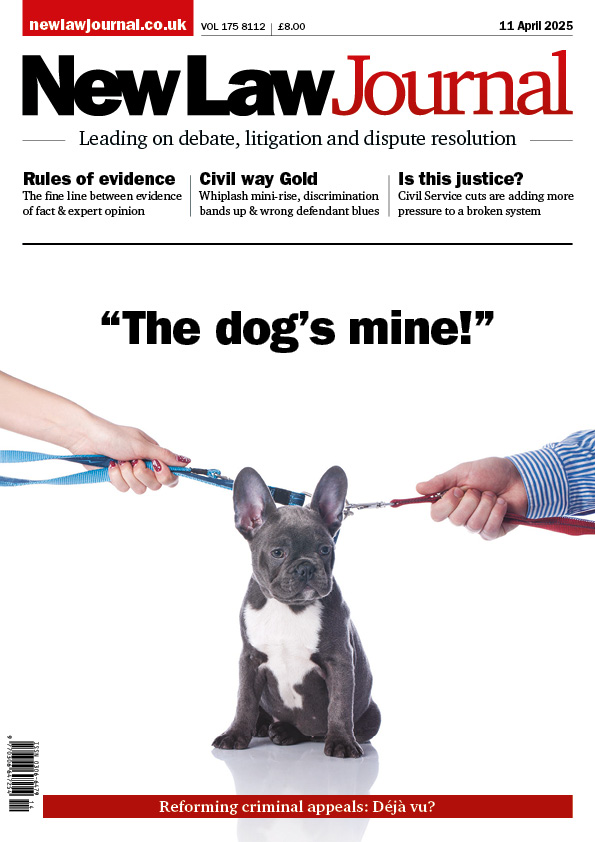THIS ISSUE

Former district judge Stephen Gold covers the legal issues and remedies where a lawyer makes a harmless error, in this week’s NLJ. Gold notes the court’s view, in the particular case mentioned, that ‘the court should not punish a party for the harmless error of its legal representatives’.
Can the Law Commission’s consultation finally deliver radical reforms 30 years in the making? Martin Rackstraw weighs up the issues at hand
Whiplash mini-rise; discrimination bands up; apologies OK; wrong defendant blues; non-binary name change.
Dr Chris Pamplin explores evidence of fact among ‘the tangled thicket’ of expert evidence
Like the elephant in the famous parable, trade mark dilution isn’t easily determined, writes Mark Engelman
Disputes over pets during divorce are on the rise. In this week’s NLJ, Shivi Rajput, partner at Stowe Family Law, looks at recent developments in the law.
Is it possible to own a freehold or leasehold estate in a tree? Mark Pawlowski digs deep
Planned cuts to the Civil Service risk adding further pressure to a public court system already at breaking point: Mark Jones & Alex Curran report on the deepening crisis
Experts can give evidence that is then considered factual rather than expert evidence within CPR 35. In this week’s NLJ, Dr Chris Pamplin, editor of the UK Register of Expert Witnesses, explores the fine line between evidence of fact and expert opinion.
The wrongful convictions of innocent sub-postmasters and of Andrew Malkinson, who was also entirely innocent, are shocking. The appeals system has been in need of ‘radical overhaul’ for decades, Martin Rackstraw, criminal partner at Russell-Cooke, writes in this week’s NLJ.
MOVERS & SHAKERS

Keystone Law—Milena Szuniewicz-Wenzel & Ian Hopkinson
International arbitration team strengthened by double partner hire

Coodes Solicitors—Pam Johns, Rachel Pearce & Bradley Kaine
Firm celebrates trio holding senior regional law society and junior lawyers division roles

Michelman Robinson—Sukhi Kaler
Partner joins commercial and business litigation team in London
NEWS
The government has pledged to ‘move fast’ to protect children from harm caused by artificial intelligence (AI) chatbots, and could impose limits on social media as early as the summer
All eyes will be on the Court of Appeal (or its YouTube livestream) next week as it sits to consider the controversial Mazur judgment
An NHS Foundation Trust breached a consultant’s contract by delegating an investigation into his knowledge of nurse Lucy Letby’s case
Draft guidance for schools on how to support gender-questioning pupils provides ‘more clarity’, but headteachers may still need legal advice, an education lawyer has said
Litigation funder Innsworth Capital, which funded behemoth opt-out action Merricks v Mastercard, can bring a judicial review, the High Court ruled last week







